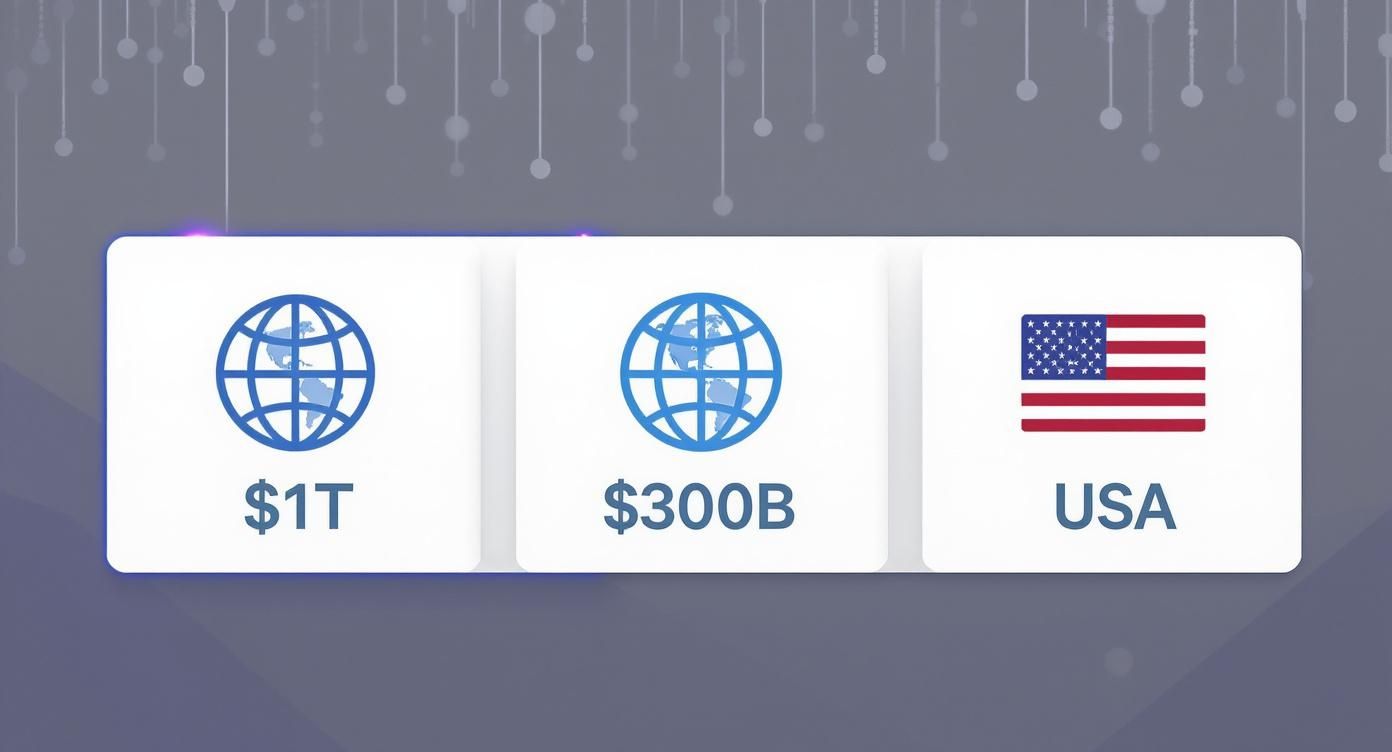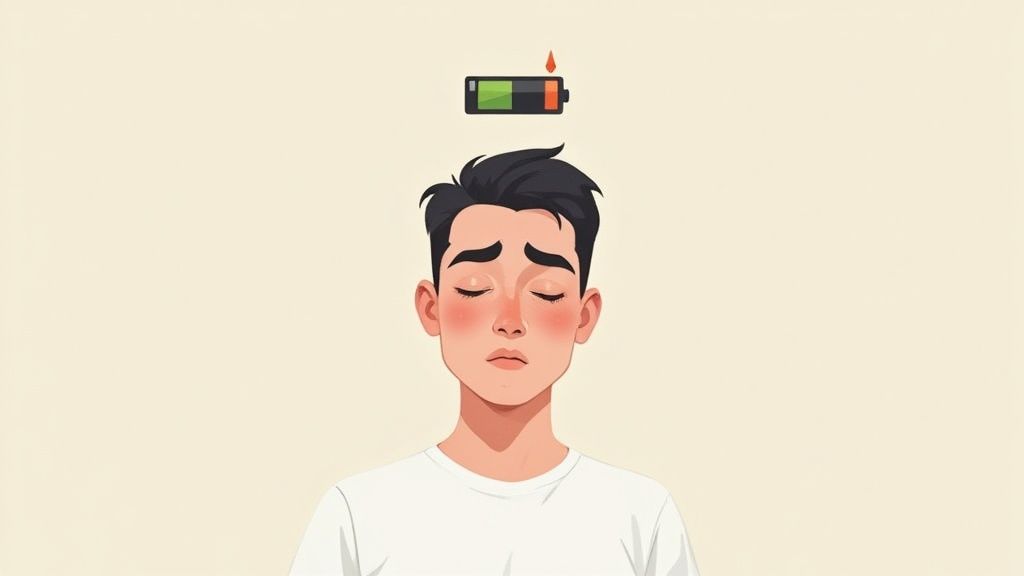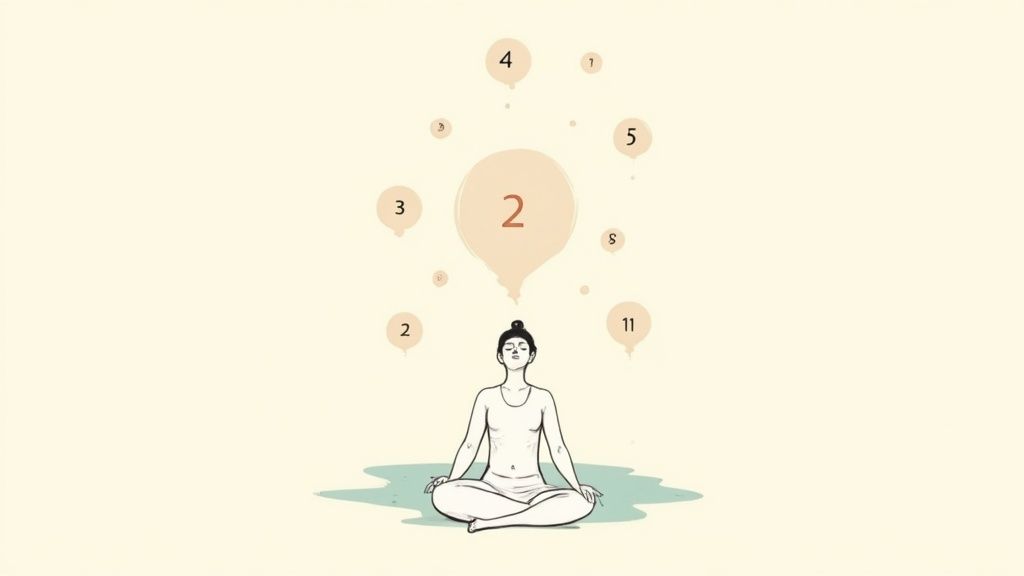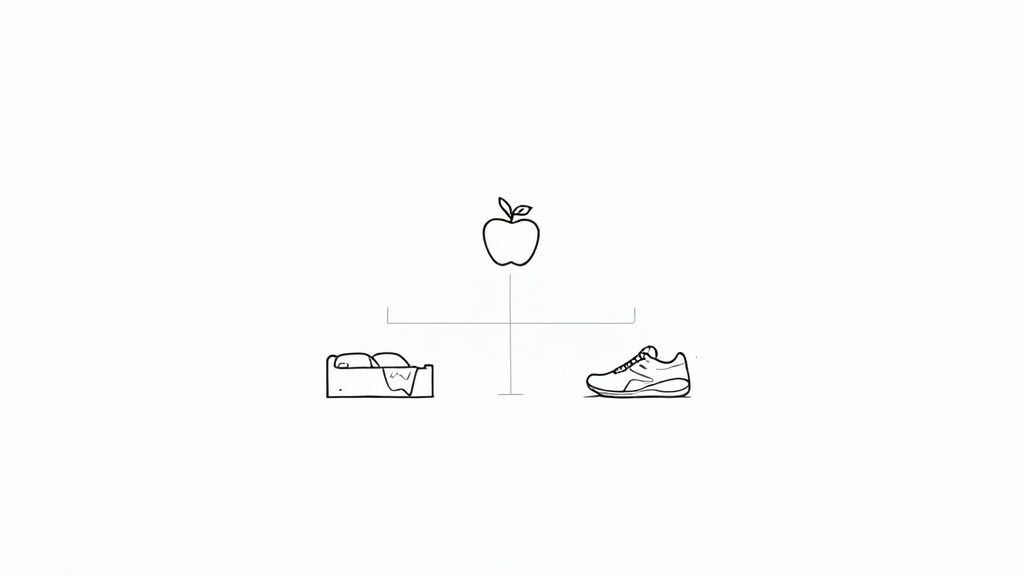Learning how to cope with stress isn't about chanting affirmations while your house is on fire. It's about figuring out what lights the match, having a fire extinguisher handy for flare-ups, and maybe fireproofing your life a little. Think of it as building a personal toolkit of strategies that actually work, from breathing like you’re not about to Hulk-out to finally setting boundaries that stick.
Understanding the Real Cost of Modern Stress
If you feel like you’re constantly juggling flaming swords while riding a unicycle, congratulations—you’re a fully functioning adult in the 21st century. That perpetual feeling of being overwhelmed isn't a sign you're failing; it's a feature, not a bug, of modern life. Stress has officially graduated from a buzzword to a full-blown systemic problem with very real consequences.
This isn't just about surviving a rough Tuesday. Chronic stress is the silent saboteur messing with our health, tanking our productivity, and fueling the global economy's anxiety problem. It’s the invisible force behind climbing healthcare costs, workplace burnout, and the nagging suspicion that your email inbox has a personal vendetta against you.
The Staggering Economic Toll
Let's talk numbers, because money talks. Workplace stress isn't just a mood-killer; it's an economic sledgehammer. The World Health Organization estimates that depression and anxiety, often stress-induced, cost the global economy nearly $1 trillion every single year in lost productivity.
And in the United States? Job stress is a $300 billion annual dumpster fire for industries. If you want to dive deeper, you can explore the workplace stress statistics that paint the full picture of this massive economic drain.
This infographic breaks down the bonkers cost of it all.

These aren’t just abstract figures. They confirm what we all feel: stress is a huge problem that impacts everything from our personal performance to the country's bottom line.
More Than Just a Feeling
The endless firehose of notifications, deadlines, and social media posturing has put our nervous systems on permanent high alert. It’s why knowing how to deal with information overload has become less of a "nice-to-have" skill and more of a basic survival tactic.
The greatest weapon against stress is our ability to choose one thought over another. – William James
Seeing the hard data is the first step. It validates what you're feeling and confirms you're not just being dramatic. Realizing that stress is a widespread, measurable crisis shifts the narrative from, "What's wrong with me?" to a much more powerful, "Okay, what can I do about this?" This is the perfect launchpad for the practical, no-fluff solutions we're getting into next.
Recognizing the Subtle Signs of Burnout

Before you can tackle stress, you first have to figure out when you've tipped over from "just a bad week" into the abyss of full-blown burnout. It's the final boss of chronic stress, and it doesn’t show up with a dramatic theme song. Nope, it creeps in quietly, usually disguised as a bad mood that overstays its welcome or exhaustion that coffee can no longer fix.
Burnout isn’t just being tired; it’s a soul-deep state of emotional, physical, and mental exhaustion from being under pressure for way too long. It's the difference between needing a vacation and fantasizing about moving to a remote cabin and changing your name to Bartholomew.
More Than Just a Bad Day
The classic symptoms of burnout go way beyond your typical stress. They show up as a nasty trio of feelings that can suck the life right out of your motivation. To actually do something about it, you have to be able to spot the key signs of burnout.
- Emotional Exhaustion: This is that bone-deep feeling of being completely drained. It’s when your emotional gas tank isn't just empty—it's been repossessed by the bank, and they’ve left a snarky note.
- Cynicism and Detachment: You start feeling negative about everything and everyone. Colleagues, clients, your once-beloved pet project—they all become sources of irritation. It's a defense mechanism, like putting up a giant emotional "DO NOT DISTURB" sign on your forehead.
- Reduced Personal Accomplishment: This is the nagging sense that nothing you do matters. Your once-meaningful work suddenly feels like a pointless grind, and you start to wonder if your biggest achievement for the day was just putting on pants.
A Generational Crisis
Think you're the only one? Think again. This has become a full-blown crisis, and the generational differences are pretty startling. The latest research paints a grim picture: a jaw-dropping 82% of employees across the globe are now at risk of burning out.
What’s even crazier is when it’s happening. For Gen Z and millennial employees, burnout is now peaking at just 25 years old. That's a whole 17 years earlier than the historical average of 42.
This isn't just a trend; it's a seismic shift in what it means to work today. Spotting these warnings early is your best—and maybe only—shot at stopping the burnout train before it goes completely off the rails.
Find Calm Now with Mindful Techniques

When your stress levels are screaming, you don’t have time for a week-long silent retreat. You need an emergency off-ramp for your brain, and you need it now. Think of mindful techniques as your immediate toolkit for hitting the brakes when your fight-or-flight response tries to drag race your sanity.
These aren't some complex, hour-long meditations that require a guru and a special cushion. They’re simple, powerful exercises you can do at your desk, in your car, or while hiding in the office bathroom.
The whole point is to interrupt the stress cycle before it spirals into a full-blown meltdown. When the pressure is on, our caveman brains can't tell the difference between a looming deadline and a saber-toothed tiger. These techniques are like a gentle tap on the shoulder to your nervous system, reminding it that you're safe and in control.
Ground Yourself in the Present Moment
One of the best ways to cope with stress is to yank your focus out of the anxiety whirlpool and plant it firmly in the real world. For this, the 5-4-3-2-1 Grounding Technique is your secret weapon. It’s simple, you can do it without anyone noticing, and it forces your brain to pay attention to your surroundings instead of the chaos in your head.
Here’s the rundown:
- See 5 things: Look around and mentally name five objects. Your monitor, a crack in the ceiling, a sad-looking office plant—anything. Don't judge, just notice.
- Feel 4 things: Bring your attention to four things you can physically feel. The pressure of your chair, the fabric of your shirt on your shoulders, the cool surface of your desk, the phone in your pocket.
- Hear 3 things: Listen for three distinct sounds. It could be the hum of the air conditioner, distant traffic, or your own breathing.
- Smell 2 things: Try to identify two different smells. The stale coffee from this morning, the scent of hand sanitizer, maybe the faint smell of rain outside.
- Taste 1 thing: Focus on one thing you can taste. The lingering mint from your toothpaste, a sip of water, or just the neutral taste in your mouth.
This method works because it forces a mental reset. By engaging all your senses, you pull the plug on panic and de-escalate that overwhelming feeling of being out of control.
If you're looking for a deeper dive, there are plenty of proven methods for naturally reducing stress that build on these principles. And for on-the-go support, our guide to the best mental health apps for on-the-go therapy can put a therapist right in your pocket.
When you're short on time, even a minute or two can make a massive difference. Here are a few quick-hitters to keep in your back pocket for stressful moments.
Quick Stress-Relief Techniques at a Glance
| Technique | Best For | Time Required |
|---|---|---|
| Box Breathing | Calming racing thoughts, lowering heart rate | 2-3 minutes |
| The 5-4-3-2-1 Method | Grounding yourself during a panic attack or anxiety spike | 3-5 minutes |
| Progressive Muscle Relaxation | Releasing physical tension held in the body | 5 minutes |
| Mindful Observation | Interrupting negative thought loops by focusing on one object | 1-2 minutes |
Try one of these next time you feel the pressure building. You'd be surprised how much a few focused minutes can do to reset your entire day.
Build Long-Term Resilience to Stress

Quick-fix breathing exercises are great for putting out fires. But if your life feels like a constant string of small blazes, it’s probably time to invest in some serious fireproofing.
Figuring out how to cope with stress for the long haul isn’t about some dramatic life overhaul. It's about building a solid foundation of resilience, brick by boring brick, so that everyday pressures don't send you spiraling into the abyss. This is where you graduate from reactive damage control to proactive self-preservation.
It all boils down to the big three pillars of well-being: sleep, nutrition, and movement. And no, those aren’t just wellness buzzwords your yoga instructor mumbles. They’re the absolute bedrock of your ability to handle whatever nonsense life decides to throw at you.
Master the Fundamentals (Seriously, Don’t Skip This)
Consistently getting good sleep is arguably the most powerful, and criminally underrated, stress management tool you have. A brain that's actually rested is way better at problem-solving, emotional regulation, and not freaking out over a passive-aggressive email.
A sleep-deprived brain, on the other hand, starts the day already in panic mode.
- Tame Your Circadian Rhythm: Try to hit the sack and wake up around the same time, even on weekends. Your body’s internal clock loves a predictable schedule, and it’ll reward you with better sleep.
- Stop Eating Your Feelings: Stress makes us crave junk. We all do it. But those high-sugar, high-fat foods that feel so good for five minutes? They send you crashing hard later. Focus on foods that stabilize your blood sugar, not send it on a rollercoaster.
- Just Move a Little: You don't need to run a marathon. Just 20-30 minutes of moderate activity—like a walk where you’re moving fast enough that you can't belt out a power ballad—can slash stress hormones like cortisol and release those feel-good endorphins.
The Fine Art of Saying "Nope"
One of the biggest drivers of chronic stress is feeling like you have zero control over your own time and energy. The antidote? Boundaries.
This isn't about being selfish or mean. It’s about protecting your sanity so you can actually show up as your best self for the things that matter.
Think of boundaries as the rules of engagement for your life. They teach people how to treat you and stop your personal resources—time, energy, emotional bandwidth—from being drained by everyone else’s endless demands.
Start small. Saying "no" to one tiny, non-essential request can feel incredibly empowering. Blocking off an hour in your calendar for "Deep Work (Do Not Disturb Unless It's a Fire or Free Pizza)" is a power move.
A simple script like, "I can't commit to that right now, but I can revisit it next week," is a polite but firm way to protect your capacity without torching your relationships. This is how you stop constantly reacting to stress and start proactively designing a life that has less of it in the first place.
How Your Environment Is Secretly Stressing You Out
So, you've optimized your sleep, perfected your deep breathing, and set up more personal boundaries than a medieval fortress. Yet, you're still stressed. What gives?
It might be time to look outside yourself. The hard truth is that stress isn't just an internal battle—it's often a direct reflection of the world you're living in. Your coping mechanisms are great, but they're only one piece of a much bigger, often messed-up puzzle.
Thinking stress is a purely individual failing is like blaming a fish for getting sick in a polluted tank. Sometimes, my friend, the problem isn't the fish. It's the water. Our environments, from our soul-crushing open-plan offices to our national policies, have a massive impact on our mental state.
The Geography of Stress
The link between where you live and how you feel becomes painfully obvious when you zoom out. We love to frame stress as a personal problem, but global data tells a completely different story—one full of geographic and structural patterns.
Take Monaco, for example. In 2025, it was ranked the least stressed country on Earth. Surprise, surprise—high quality of life, financial security, and social stability tend to chill people out. On the flip side, nations like Burundi and South Sudan are drowning in stress due to economic chaos and conflict. It’s pretty clear proof that external pressures have a huge say in our internal peace. You can see the full global stress rankings for yourself and marvel at how much circumstances dictate our well-being.
Acknowledging that external factors—like economic stability, social support, and workplace culture—are major drivers of stress isn't an excuse. It's context. It helps shift the narrative from "What's wrong with me?" to "What's wrong with this system?"
This perspective is empowering. It gives you permission to advocate for healthier environments. That could mean pushing for better policies at work, supporting community initiatives, or just giving yourself a break by recognizing that you're navigating a ridiculously challenging system.
Even tracking your own body's reactions with technology can offer some wild insights. Our article on wearable health tech dives into how these little wrist-judges monitor the physiological smackdown your surroundings are delivering. Understanding the big picture is the first step toward creating change, both for yourself and for the world you're stuck in.
Your Burning Questions About Stress, Answered
Look, if you're trying to figure out this whole stress thing, you're not alone. It's a confusing mess that often leaves you wondering, "Am I losing my mind, or is this normal?" Let's clear up some of the most common questions.
What Is the Difference Between Stress and Anxiety?
Think of it this way: stress is a response to an external cause. It’s your body reacting to a tangible threat, like your boss dropping a last-minute project on your desk at 4:59 PM on a Friday. Once that project is done (or ignored), the stress usually chills out.
Anxiety, on the other hand, is an internal reaction that loves to hang around long after the party's over. It’s that lovely feeling of dread or worry that sticks with you even when there’s no clear reason for it. It's the alarm system that's still blaring even after the burglar has left and stolen your good snacks.
How Can I Tell If My Stress Is Becoming a Serious Problem?
Everyone gets stressed. It's when it starts showing up uninvited to every part of your life that you've got a problem.
Pay attention if your stress leads to significant changes in your sleep, appetite, or mood that last for more than a couple of weeks. When stress becomes chronic and unmanageable, it's a signal to seek professional support.
A few other red flags that your stress is getting out of hand:
- Constant Irritability: You find yourself snapping at your dog for barking, your Roomba for bumping into a wall, or a cheerful barista for asking how your day is going.
- Physical Symptoms: Those aren't just random headaches. Your body is trying to tell you something with frequent stomach problems, muscle tension, or that weird eye twitch you've developed.
- Social Withdrawal: You start dodging calls from friends and canceling plans for things you used to love. Your couch has become your best and only friend.
Can Stress Ever Be Good for You?
Believe it or not, yes—but only in small, controlled explosions. This "good" stress is called eustress. It’s the jolt of energy that helps you nail a presentation, the push that gets you across the finish line of a race, or the focus you need to meet a tight deadline without dissolving into a puddle of tears.
The trouble starts when that short-term pressure just… never… stops. That's when it morphs into chronic distress. The whole game is about balance. A little bit of eustress can make you sharper, but relentless stress will just grind you down. Learning how to manage the bad kind is how you make room for the good.
At Nkahoot, we're firm believers that a solid laugh is one of the best ways to kick stress to the curb. If you're over the endless doomscroll and want a smarter, funnier take on the world, come check out our latest articles at https://nkahoot.com.


